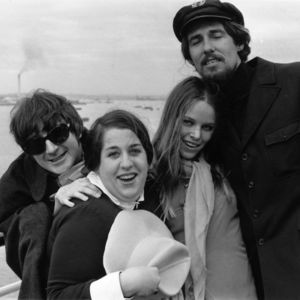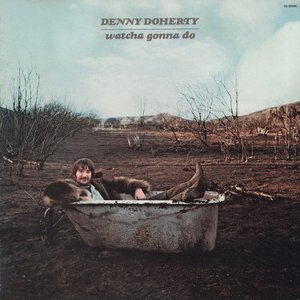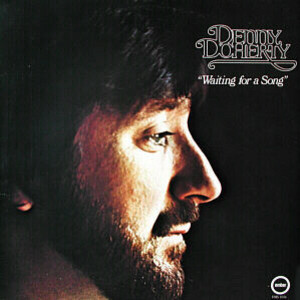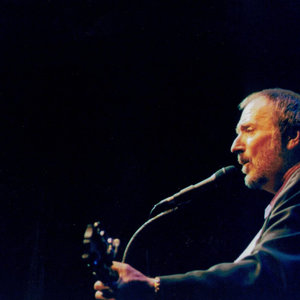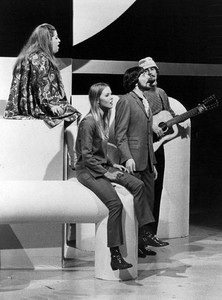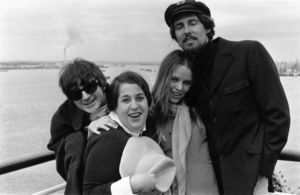Doherty, Denny
Websites:
https://www.dennydoherty.com/
Origin:
Halifax, Nova Scotia, 🇨🇦
Biography:
The year is 1966. A 26-year-old Denny Doherty, riding a wave of fame as part of the California foursome The Mamas & the Papas, is enjoying a quiet drink at an exclusive club in the heart of swinging London. Suddenly a member of that other fab four sits down beside him. "Aren't you . . ." says the man with the unmistakable Liverpudlian accent. "Aren't you . . ." replies the Halifax-born Doherty, dumbstruck at meeting one of his musical idols. John Lennon then scans the room and quips, "We are, aren't we." Soon the pair is joined by Paul McCartney, bearing a bag of marijuana, and together they repair to Doherty's digs where he wakes up his band-mate "Mama" Cass Elliott for a personal version of Meet The Beatles. The new friends spend the rest of the night talking and singing by the fire as McCartney plunks the keys of an out-of-tune piano. At sunrise, Lennon and McCartney head off to Abbey Road studios to continue recording a little something called Sergeant Pepper's Lonely Hearts Club Band.
That is just one of dozens of wryly delivered postcards from the far-out edges of the 1960s that form the nucleus of Dream A Little Dream, which opened last week at Halifax's Neptune Theatre. The play, co-written (with Nova Scotia playwright Paul Ledoux) and performed by Doherty, recounts his dizzying climb from the working-class streets of Halifax's north end to the heady, hedonistic years he spent as a member of the band that gave the world such classic pop songs as California Dreamin', Monday, Monday and Dedicated to the One I Love. The production also offers a candid portrayal of the sexual intrigues and petty jealousies that led to the breakup of the group in 1969 - and hints at the even tougher times that lay ahead for some band members when the dreamin' turned into a much darker post-Sixties reality of drug addiction, criminal convictions and financial insolvency.
For most of the two-hour play, Doherty is the sole presence on stage, sitting on a stool, strumming his guitar and conjuring verbal images of an era forever framed by sex, drugs and rock 'n' roll. At various musical interludes, he is joined by a band of mostly Nova Scotia musicians, including vocalist Doris Mason, who makes brief, but striking, appearances as Mama Cass.
Doherty's tale pauses briefly over the details of his childhood in the gritty Halifax neighborhood also occupied by a prison, a slaughterhouse and the city dump. At age 20, the dockyard worker's son was rebuffing his father's offer to become a machinist's apprentice in favor of fleeing town with two other aspiring musicians to form a folk trio that became known as "The Halifax Three." The group eventually landed in New York City, where they performed on the street and lived in what Doherty describes as a "roach palace" of a hotel in Greenwich Village.
The Village was then the epicentre of a folk-music scene that featured established acts like Peter, Paul & Mary and Odetta, as well as a scrawny Minnesota-born newcomer named Bob Dylan. It was in Manhattan that Doherty met up with Cass Elliott, a hefty, hard-drinking woman with a powerful voice who fronted a blues group, The Big Three, and John Phillips, a gangly six-foot, five-inch songwriter who had already made a minor splash with the folk trio the Journeymen. Together with Phillips's gorgeous young California-born bride, Michelle, they would soon become The Mamas & the Papas.
But not, as Doherty documents, without first enduring a few birthing pains. It was by then 1964, and The Beatles had invaded America. Doherty and Elliott adored the new British beat, but "Papa" John Phillips, a folk-music purist, took more persuading. In one of the play's more raucous scenes, Doherty recounts how Mama Cass turned on the foursome to LSD, and how he seized the moment to force John Phillips to listen to Beatles' music. As the house band launches into an infectious version of Twist and Shout, Doherty recalls that Phillips's initial reaction was a disdainful: "It's too simple. It's three chords, Dennis!" But as the LSD kicked in - signified by a shimmering light show on stage - Phillips began to relent.
The quartet headed next to California, where they quickly landed a recording contract on the strength of their fresh folk-rock sound and the backlog of songs Phillips had been penning. They lived the grand life, but there was a serpent in the garden. A long-standing flirtation between Doherty and Michelle Phillips had blossomed into a full-fledged affair. In the spirit of the times, the participants in the love triangle came up with an unconventional solution. Papa John and Doherty moved into a house together in the Hollywood Hills, vowing that neither one would see Michelle. Of course, both of them did so on the sly, and then ended up co-writing one of the band's most popular songs, I Saw Her Again, which includes the lyric: "Every time I see that girl/You know I want to lay down and die/But I really need that girl/Oh, I'm living a lie."
In Doherty's telling, the band imploded just as the music exploded. Even as their songs were topping the charts, Michelle was temporarily kicked out of the group after engaging in increasingly brazen romances with rival musicians. The always tense relationship between Papa John and Mama Cass continued to deteriorate, largely due to Phillips's refusal to recognize Elliott's crucial musical contribution to the group. As for Doherty, he slipped ever further under the influence of his drug of choice - rye whisky - and his California mansion turned into a refuge for doped-up hippies and groupies. It got to the point where he was buying the hangers-on one-way tickets to Paris just to get them out of the house.
By the end of the 1960s, the band was washed up. But for Doherty, the final blow came on July 29, 1974, when he received a call informing him that Mama Cass had just died of a massive heart attack. Which is how he closes the play. But it is far from the end of the story.
Sitting in his dressing room at the Neptune Theatre one evening last week, the fast-talking, affable Doherty completed the narrative. He has weathered a few storms since the breakup of the band, and it shows: balding, craggy-faced and slightly paunchy, he is a far cry from his days as a dreamboat poster boy of the 1960s. But his eyes still sparkle with mirth and a sense of mischief.
Following Elliott's death, Doherty returned to New York for a disastrous theatrical debut in a Broadway musical written by John Phillips. It closed after five performances. He also discovered he was broke. To this day, he says, he has never been given a proper accounting of the number of records the group sold or the amount of money they should have rightfully earned. "I don't care anymore," he says with a wave of his hand. "It's been so long. Even if I was ripped off for $10 million, it's gone. That was just the craziest time in the world. Everybody got ripped off."
Some good came of his brief turn on Broadway: he met his wife, Jeanette, who was in the play's chorus line. The two were living in a crummy apartment in Hell's Kitchen, he says, when he suddenly remembered that he still owned a house in Nova Scotia. He returned to Halifax with Jeanette in 1977, and over the next few years acted in several plays at the Neptune directed by John Neville.
In 1980, Doherty received a call from John Phillips, who wanted to reunite the band. Later that same week, Phillips, who by that point had a serious heroin habit, was arrested on drug distribution charges. "He was supposed to do 15 years in jail, but instead served 28 days in minimum security," says Doherty. "I think it's called turning state's evidence."
For the past 17 years, Doherty has done lengthy stints on the road as part of a patchwork Mamas & Papas, sometimes joined by John Phillips and featuring various female stand-in singers (Michelle Phillips opted for an acting career, winding up with a long-running role as a middle-aged vixen in the prime-time soap Knots Landing). Along with other 1960s nostalgia acts like Herman's Hermits and Donovan, Doherty has performed all over the world for audiences who, as he jokingly puts it, "are there to remember where they were when they first heard the music - if they can remember anything at all."
Since 1987, Doherty, his wife and their two children, Emberly, 16, and John, 15, have lived in the Toronto suburb of Mississauga. From that base, he has also pursued acting jobs, landing his biggest part in 1993 as the genial harbormaster in the hit children's show Theodore Tugboat, which is partly shot in Doherty's old elementary school in Halifax. In the show, which now airs in more than 70 countries, the former bad boy is the epitome of paternal wisdom and reliability. So what does Doherty, who finally swore off booze in 1980, tell his own children about his youthful excesses? "I don't tell my kids to do this or not to do that," he says, "other than to say, 'Be aware of what's out there and what a quagmire it can turn into.' " Listen to Papa Denny, kids. He knows whereof he speaks.
Brian Bergman, Maclean's November 17, 1997
He was born Dennis Gerrard Stephen Doherty and he was a singer, songwriter, sometime actor and one-quarter of the legendary 1960s folk-rock group, The Mamas and The Papas.
Born in Halifax, Doherty’s name, no matter what he did in his life, will always be tied to his time in music. Doherty launched his in 1960 in Montréal as co-founder of the Colonials, which went on to become the Halifax Three. In 1964 he formed a group called The Mugwumps with Cass Elliot. Leaving Elliot behind, he later joined a group called The New Journeymen, where he met John and Michelle Phillips. When they decided to form their own group, Elliot rejoined Doherty and the Mamas and Papas were born.
What most people forget, if they ever knew it, is that the group was almost a flash in the pan. They lasted just 3 years and ended due to abusive drug use and intergroup sex problems. But they also produced five albums and had 10 hit singles. Some of their songs remain essentially anthemic, helping to define a time and place not just in music, but in the rise of the youth culture which would come to dominate almost all forms of culture, fashion, publishing and communication within a few short years. It is thought that the group sold some 20 million records before they disbanded in 1968.
Doherty tried a solo career but despite having some big labels behind him, his career never took off. His acting career started in the 1970s when he appeared on Broadway in the 1974 play Man on the Moon, a musical written by John Phillips. Back in his home town of Halifax in 1978, Doherty performed with John Neville at the Neptune Theatre in plays like The Taming of the Shrew, Much Ado About Nothing and Cabaret. Doherty was also involved in a number of musical projects, including an autobiographical musical, Dream a Little Dream, which premiered in Toronto in 2001.
Only Michelle Phillips (born 1944) remains. Cass Elliot died as a result of a heart attack in 1974, when she was just 30 years old. The group’s chief songwriter and producer John Phillips, who had at last successfully transitioned to a drug-free life and was starting to rebuild his career, died in 2001 when he was 65. Inducted into the Canadian Music Hall of Fame in 1996, Denny Doherty died suddenly at his home in Mississauga, Ontario, just west of Toronto, after suffering an aneurysm in his abdomen. He had turned 65 two months earlier.
-Ralph Lucas
Born Dennis Gerrard Stephen Doherty, November 29, 1940, in Halifax, Nova Scotia, Canada; died of kidney failure, January 19, 2007, in Mississauga, Ontario, Canada. Singer and songwriter. Denny Doherty was a member of the immensely successful 1960s rock group the Mamas and the Papas, who issued a string of Top Ten hits in the late 1960s that helped define the era musically. Among their best-known songs is the memorable “California Dreamin’,” a 1966 hit that came to embody the spirit of the hippie era. “Alongside the work of the Beach Boys and the Byrds,” the songs crafted by Doherty and his bandmates, noted the Times of London, “helped to create the myth of America’s West Coast as an endless playground of sun, eternal youth, and untroubled hedonism.”
A native of Halifax, Nova Scotia, Doherty moved in his late teens to the bigger city of Montreal. There, in 1959, he founded a folk act called the Colonials, which eventually became the Halifax Three and cut a record that failed to achieve much chart success. Doherty and a friend then headed south to New York City, where they began playing the Greenwich Village folk circuit, and there he met Cass Elliot, a young woman with a rich voice also working the folk scene. Together they formed a group called the Mugwumps, then teamed with a young married couple, singer-songwriter John Phillips and his wife, Michelle Gilliam Phillips. After several name changes, the quartet finally settled on the Mamas and the Papas after watching a television documentary film about a notorious U.S. motorcycle gang whose girlfriends were called “mamas.”
Doherty and the other three eventually made their way to California, where Dunhill Records chief Lou Adler signed them. They originally sang backup for “California Dreamin’,” written by Phillips, when the known star Barry McGuire (“Eve of Destruction”) recorded it, but that failed to chart. Even their version, with the soaring harmonies that became their trademark sound, failed to catch on immediately, but began to surge on the charts in February of 1966—especially in parts of the United States still suffering under winter weather. It reached No. 4 and made the Mamas and the Papas instant stars. The group was rather unusual for the time, as a rock act with performers of both genders, and they gave off an air of attractive bohemian camaraderie.
Doherty and his bandmates were later quite candid about the drama and substance abuse behind their free-spirited image and astonishing vocal harmonies. Elliott was in love with Doherty, but he spurned her attentions and instead harbored a crush on Michelle Phillips, which eventually turned into an affair. “I Saw Her Again” was one of the band’s hits, which Doherty and John Phillips had written together about Michelle. A period of immense wealth and typical rock ’n’ roll excesses of the era ensued as the band racked up hit after hit over the next year; they also organized the famed Monterey Pop Festival in 1967, the first of the era’s major rock festivals. Doherty owned a Laurel Canyon mansion once belonging to silent film star Mary Astor. The divorce of John and Michelle Phillips spelled the end for the band in 1968, though they returned to record one more album for their label as a contractual obligation in 1971.
Doherty, John Phillips, and Elliot each had solo careers, but Elliot’s was the only one to attain a modicum of success. This was cut short by her sudden death in 1974; John Phillips died, somewhat not unexpectedly, in 2001 after having received a liver transplant some years earlier as a result of his long-time substance abuse. In the 1980s, however, he and his daughter, television actor Mackenzie Phillips, had regrouped with Doherty as a reunited Mamas and the Papas, with a replacement for Elliott, and toured for several years but never recorded. Returning to Canada, Doherty became known to a generation of Canadian children as the host of a long-running series Theodore Tugboat that aired on the Canadian Broadcasting Corporation.
In the late 1990s, Doherty wrote and produced a stage work, Dream a Little Dream: The Nearly True Story of the Mamas and the Papas Musical, in which he also appeared when it was staged at an off-Broadway venue in 2003. In early 2007 he suffered a ruptured aortic aneurysm in his stomach and underwent surgery for it, but his kidneys failed afterward. He died in Mississauga, Ontario, on January 19, 2007, at the age of 66, survived by only one group member, Michelle Phillips. He was widowed twice and is survived by his son, John, and daughters, Emberly and Jessica.
The hits Doherty recorded with the Mamas and the Papas remain evocative sonic postcards from the long-gone era. The singular blend of their four voices is best exemplified on songs such as their Shirelles cover, “Dedicated to the One I Love” and “California Dreamin’”—a song that seemed to speak to an entire generation of young baby boomers and their desire to break free of convention by heading out West to places such as Los Angeles and San Francisco, where the counterculture was in full swing at the time. In a 2005 Kansas City Star newspaper interview quoted by Joal Ryan for E! Online, Doherty is said to have recounted that fans often came up to him and explained the impact of “California Dreamin’” on their lives, saying, “They [would] go ‘I was living in my father’s Oldsmobile in Minnesota, and I heard that song and I just went to California.
-encyclopedia.com
Maritimer Denny Doherty was a renowned Canadian singer, songwriter and musician. He is most widely known as a founding member of perhaps the most iconic folk group of the 1960s, The Mamas & the Papas.
Born in Halifax, N.S., in 1940, Doherty formed his first folk trio at the age of 19. Named The Colonials, the group played across Canada and, after changing the name to The Halifax Three, signed a recording contract in New York. After the trio broke up Doherty joined Cass Elliot as a member of her group, The Big Three. Inspired by the Beatles, The Big Three recruited Zal Yanovsky and John Sebastian and changed its name to The Mugwumps. Although the folky, rocking Mugwumps broke new ground, a record release was not forthcoming and the band split up. While Sebastian and Yanosky went on to form The Lovin’ Spoonful, Elliot and Doherty joined up with fellow folkies John and Michelle Phillips to become The Mamas & the Papas.
Success shone brightly on the group after a move to Los Angeles in 1965. With top-selling albums and singles such as “California Dreamin’,” “Monday Monday,” and “I Saw Her Again,” The Mamas & the Papas were one of the biggest bands in rock ‘n’ roll from 1965 to ’67. The group had nine top-40 hits during this time (six reached the top five) and albums included debut If You Can Believe Your Eyes and Ears, which went to No.1, The Mamas & the Papas which reached No.4, Deliver, which hit No.2 and the compiled-hit LP Farewell to the First Golden Era, which reached No.5.
After the demise of the group in 1969, Doherty recorded two solo albums and embarked on an acting career. He returned to New York City where he played the lead on Broadway in Phillips’ Man on the Moon. In 1978 he went to Halifax to host Denny’s Sho for CBC TV and also continued to act, landing the lead in Paul Ledoux’s North Mountain Breakdown as well as many roles at Neptune Theatre.
The Mamas & the Papas reunited in the early ’80s – apart from Elliot, who passed away in 1974 – with original members Doherty and John Phillips, plus Spanky McFarlane and Phillips’ daughter, Mackenzie. Doherty continued to perform occasionally with the group, squeezing in appearances between theatre engagements such as Fire and The Secret Garden and tapings of the hit children’s TV show, Theodore Tugboat.
In 1999, Doherty also played the role of Charley McGinnis in 22 episodes of the CBC Television series Pit Pony. In 2004, he appeared on Sharon, Lois & Bram’s 25th anniversary concert, 25 Years of Skinnamarink, singing two songs with the host trio: “California Dreamin’” and “Who Put the Bomp?”
Doherty’s final role embraced comedy, appearing as FBI Special Agent Ryan Shockneck in the season seven finale of the Canadian TV comedy series, Trailer Park Boys. Filming was completed just shortly before his death in early 2007. The show was fittingly dedicated to his memory.
-Canadian Music Hall of Fame
Denny Doherty was born and reared in Halifax, Nova Scotia, Canada and began his musical career there in a local rock band, The Hepsters, while working in a pawn shop. He had started singing in public at age 15, on a dare by performing "Love Letters In The Sand" in a skating rink-turned-dance-hall. In 1959 he formed his first folk trio, The Colonials, and after changing their name to The Halifax Three, signed a recording contract in New York. After recording two albums, the trio broke up, and Denny linked with Cass Elliot as a member of her group, The Big Three, which later became The Mugwumps, the first folk-rock group. Cass and Denny later joined John and Michelle Phillips of The New Journeymen to become The Mamas and The Papas. In 1965 the group relocated to Los Angeles where, over the next four years, they turned out a score of top-selling albums and singles featuring Doherty and Elliot's lead vocals, including "California Dreamin'," "Monday Monday" and "I Saw Her Again." Upon the collapse of the group, Denny recorded two solo albums, and material for an unreleased third. (One of these albums reunited him with former Mamas Michelle and Cass as they sang background vocals for 1974's Waiting For A Song.).
Doherty played the lead in Andy Warhol and John Phillips' Man on the Moon on Broadway in 1975 and Doherty was cast in The Irish Art Centre's Juno and the Paycock. In 1978 he returned to Canada and hosted "Denny's Sho" on Canadian television. During the 1980s he reunited with fellow Papa, John Phillips in The New Mamas and Papas and toured the United States as well as Europe and Asia. Having returned to home in Canada, Doherty's many stage credits there include North Mountain Breakdown, Needfire and Paul Ledoux's Fire as well as The Secret Garden. Film/TV credits include "Pit Pony" and The Harbourmaster in "Theodore Tugboat." Denny was inducted into the Canadian Music Hall of Fame in 1996; The Mamas and The Papas were inducted into the Rock and Roll Hall of Fame in 1998, and the Vocal Group Hall of Fame in 2001. In recent years, Doherty told the tale of his life with The Mamas and The Papas, in Dream A Little Dream which ran in Halifax, Toronto, and finally Off-Broadway in 2003. Doherty was married briefly to Linda Woodward in the early seventies with whom he had a daughter, Jessica. He lived outside Toronto with his other two children, Emberly and John, to whose mother Jeannette, Doherty was married for twenty years until her death in 1998. He died on January 19, 2007, following kidney problems.
-www.dennydoherty.com
